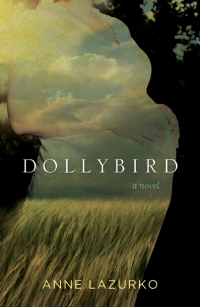Dollybird
By Anne Lazurko
256 pages, $19.95
Clearwater
By Kim McCullough
248 pages, $19.95
Both published by Coteau Books and reviewed by Diana Davidson
Two debut novels from Western Canadian writers challenge us to think differently about the West – both past and present.
Anne Lazurko’s novel Dollybird focuses on the small town of Ibsen, Saskatchewan, in 1906. Her protagonist Moira is a young unmarried pregnant woman journeying from Newfoundland to find anonymity and escape scandal. Moira is a headstrong woman determined to make a life for herself and her infant-to-be – even if it means becoming a Dollybird, a phrase that describes both a housekeeper and a whore, for a hapless man trying to make his fortune in wheat. In the opening chapter, while on the “grain train” from Halifax, Moira notices a young man travelling alone with his toddler son and empathizes with his plight.
Lazurko writes from both Moira and the young widowed father’s points-of-view in alternating chapters. This structure allows her to explore tension between Moira’s inherited Scottish pragmatism and Dillan’s Irish-inflected Nova Scotian Catholicism. There is a certain irony that both come from the East coast to landlocked Saskatchewan. A scene where Dillan labours at digging a well proves to be a turning point in their unconventional relationship.
An early scene of a medicine show in Moosejaw shows us Moira’s inherited interest in her father’s profession as a doctor. Subsequent scenes in which Moira witnesses and/or practices healing will interest readers of historical medical fiction. Lazurko’s novel also tells us about prostitution, women’s (lack of) rights, and difficulties of pregnancy and childbirth. These themes make Dollybird a newer settlement narrative.
The novel’s strength lies in its glimpses into not only the hardship but also the tight sense of community that marked pioneering men and women. While Ibsen is a real place name in Saskatchewan, the name also calls to mind Ibsen’s Nora trapped in her dollhouse. Lazurko’s title speaks to the confining roles women were permitted to have as the West was “settled” and to the difficulties women faced when they, like Moira, tried to resist them.
Kim McCullough’s Clearwater tells the story of two young people at the end of the 20th century who are struggling to make sense of their fractured worlds. Claire and Jeff meet when Claire’s family moves into the other side of Jeff’s family’s duplex in Clearwater Lake, Northern Manitoba. McCullough juxtaposes the teenagers’ relationship against the harsh North, the violence inherent in Jeff’s home life, and the violence that comes to define Claire’s. Jeff and Clair’s desire for one another is real and complicated and drives the narrative.
Place is important in Clearwater. In her descriptions of landscape, and how it mirrors the characters’ interior lives, there are moments in McCullough’s book that remind me of Lawrence’s “The Loons.” Take, for example, the second clause of the opening line: “the sky is in ink-dark canvas held in place at its bottom edge by the pointed tops of even blacker spruce trees.” Later, when Claire returns to Regina, the urban prairie is a place where “snow gathers on the ground in puffy drifts, then shifts into whirling wraiths across the sidewalk.”
McCullough chooses a tricky structure for the novel: she moves back and forth between third person and first person for both Jeff and Claire’s perspectives. It works. The point-of-view volleys to create both intimacy and distance between the reader and the story.
McCullough knows her teenagers: the novel’s narrative voice is never condescending towards them (even when it is omniscient) and her characters’ dialogue and actions consistently read as authentic. She also deals, adeptly, with the difficult legacy of colonialism and racism against First Nations and Métis peoples in Jeff’s identity and in his mother Rita’s history at residential school. McCullough’s novel weaves issues of domestic violence, sexual assault, substance abuse/addiction, and suicide into the story of Jeff and Claire’s relationship with honesty and care. And she transitions them into believable, flawed, and compelling adult characters in the second half of the novel.
Never preachy, Clearwater deals with a complex postcolonial, Northern setting and people making their lives in ways that will appeal to both YA and literary fiction readers. It is a layered book. And even though McCullough’s story is difficult, and often dark, it ends with a promise of renewal and, maybe even, redemption at the water.
Check Coteau Books (www.coteaubooks.com) and the authors’ websites (www.annelazurko.com and www.kimmccullough.ca) for more events.
Diana Davidson’s debut novel Pilgrimage is out this fall with Brindle & Glass. She has been long- listed for CBC Writes and won a Writers Guild of Alberta award. Davidson blogs at www.dianadavidson.org.

{ 0 comments… add one now }